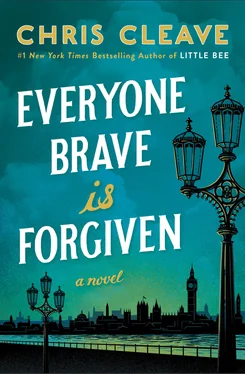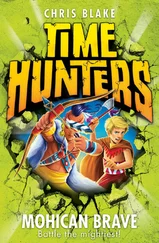As the dark afternoon sank into night they made their way in silence through the blind city. Their footsteps were softened by the snow. The incalculable damage was hidden, the mounds of rubble turned by the drifts into the shapes of clouds or waves — forms that might naturally be expected to blow through when kinder weather came.
As the light and the sound faded to nothing, all that was left was the two of them. Underneath everything lay the colossal buried city — the patched-up pipes and the improvised lines of communication and the subterranean refuges from the great disincorporating influence of bombs. With the snow it was possible to forget it.
Perhaps, thought Mary, they really would rescue each other in turn. Perhaps the city would stand. For now, though, she could only hold Tom’s hand. The snow settled. One settled.
The searchlight beams rose from their rooftop installations, up through the swirling snow, and played in blue-white circles on the base of the clouds. One could follow the elegant line of a beam up into the whiteness of the storm that spanned all of Europe in its vortex. One could take in the vast sweep of the winter and follow a thin searchlight beam down again into the vigilant city and understand how very fragile it was: a woman and a man holding hands, on streets made nameless by snow.
“I love you,” she said.
“Do you?”
She smiled. “Oh, let’s not go to my parents’. It isn’t far to your place.”
There was an urgency now in the heat of their hands as they clung to each other. This snow would thaw. These winds would blow the clouds away. The next night might see a bomber’s sky.
ALISTAIR SAILED THE BOAT while Simonson — one of two other captains attached to 200 Battery, 10 Heavy Anti-Aircraft Regiment, Royal Artillery — fished for tunny with a trawling line. In a fourteen-foot sailing dinghy, half a mile off the east coast of Malta, with a breeze blowing in off the immaculate Mediterranean and with two bottles of the local beer in a string bag trailing in their wake to cool, the war seemed improbable and excessive.
“No, I’m afraid you will have to run it past me again,” said Alistair, nudging the tiller with his toe. “There’s a man called…?”
“Something Hitler,” said Simonson. “Axel? Albrecht? German chap.”
“And he wants…?”
“To take over the running of the world.”
“What, all of it?”
“So I hear.”
Alistair frowned. “With all its tedious responsibilities along with the evident perks?”
“One imagines the fellow has weighed it up and decided to press on regardless.”
“Has he considered how vexatious it would be to find oneself in charge of us? Or how independent-minded the Americans are? I should think it would be frowned upon to turn up in Manhattan and start directing the traffic. As a European, I mean.”
“My dear boy, these are questions we Brits have thrashed out over centuries. One cannot expect a Hun to have quite the same level of insight.”
Alistair got his pipe alight while steering with one foot, trimming the jib with the hand he held the match in. He puffed white smoke that the wind scooped away prettily over the russet cloth of the mainsail.
He said, “This German fellow sounds like a card.”
Simonson gave the trawling line an experimental tug. “He has only one testicle, you know.”
Alistair raised an eyebrow.
“Oh yes,” said Simonson. “It is well known.”
One thousand miles to the west lay Gibraltar; one thousand miles to the east, Alexandria. Though it was nearly Christmas and the water too chilly for swimming, it was pleasant in the sun and the two men were comfortable in white shirts and civilian slacks. Simonson pulled in the trawling line to check that the spinner was not tangled.
He spat in disgust. ‘Two hours and not a single bite. Fish are Nazis.”
“Maybe you’re using the wrong lure.”
Simonson shook his head. “The fish are mocking me. They know I’m famished and they’re swimming six inches behind the spinner, in their silvery lederhosen.”
“They are goose-swimming,” said Alistair, using a hand to approximate the motion.
“Well of course,” said Simonson. “They are the master plaice.”
While they both looked back at their wake, a floating mine bobbed in it. Only the topmost part, black and lethal with protruberances, broke surface in the troughs of the waves. They could only have missed it only by inches.
“Ah,” said Alistair, “the upwind mark. I must ask the Commodore to paint them a little brighter.”
They tacked the boat and had another look as they went back past.
“Would it have gone off if we’d hit it, do you suppose? With our wooden hull? Or do they only trigger by magnetism?”
“How curious are you to find out?”
“Absolutely not at all.”
“Let’s try to miss it all over again then, shall we?” said Alistair. “I suppose we ought to be getting home, in any case.”
“Oh god, is it wartime already?”
“Look on the bright side: it’ll be dinner when we get back.”
Simonson groaned. Dinner that night would be with the regiment in Valletta, in Fort St. Elmo at the mouth of Grand Harbour. Having shaved and dressed, they would go down into the bowels of the fortress that had survived Malta’s great siege in the sixteenth century. In the officers’ mess room they would sit at folding aluminium tables to eat the pitiful rations of the present blockade: a small lump of bully beef let down with flour and potato, and on every third day the tinned Maconochie’s stew that was so foul it was almost a blessing to have it in ever smaller quantities as the convoys became harder to fight through to the island.
Alistair grinned at his friend’s displeasure. He pulled in the beer net while Simonson let out the trawling line.
“Do me a favor?” said Simonson.
“Ask away,” said Alistair, prising the tops off the beers.
“If we don’t catch a fish, butcher me and tell the cook I’m pork.”
“Don’t flatter yourself that it hadn’t already occurred to me. I’m a sentimental fool for letting you have a beer first.”
They headed for the land, pointing in to St. Paul’s Bay where the apostle had been shipwrecked. Alistair had checked every particular of the account in Acts against the relevant Admiralty chart and found nothing wanting. He had been on Malta three months now and he liked the way the island lived in the full embrace of time. In London, bedded in its clay, one viewed history as a reworkable legend, a great entertainment of doubtful veracity and liable in any case to revision whenever the next mudlark waded into the Thames at low tide and pulled out some iconoclastic sherd.
London was a crowd-pleaser, a protestant, a voluntary amnesiac, living to disinter stories only to arrange their bones in a sly new order. But Malta was permanent rock, with barely an inch of topsoil. Time, having nowhere to hide, had colonized the surface instead and lay there with its full duration exposed. In niches in the limestone studded with fossil shells, Alistair had seen eight-thousand-year-old statuary hung with paper garlands on the feast days of the saints. In a tiny, dark, incense-smelling chapel into which he had strayed to have a moment away from the war, Alistair had found what he thought might be a Caravaggio. The priest had neither known nor minded — he had simply said that the painting was by a local artist.
Alistair finished his beer while it was still cold, and flipped the empty brown bottle over his shoulder into the depths. Their white wake hissed through the sea.
“What are you smiling about?” said Simonson.
“I had a love letter in this morning’s post.”
Читать дальше












